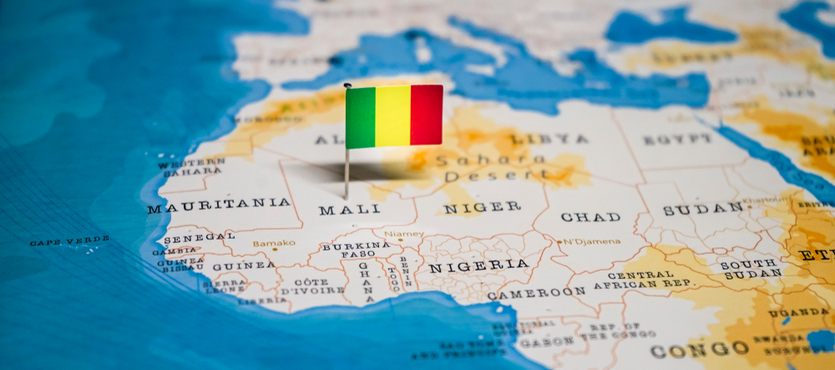The troubled West African nation is paying Russian mercenaries over $10 million a month, according to General Stephen Townsend of U.S. Africa Command.
Government conflicts with militants linked to the Islamic State and al Qeada have displaced over 20 million people in this West African nation that is twice the size of Texas. Wagner Group fighters are increasingly handling the fighting. Westerners say that Mali has essentially prohibited international peacekeepers from operating in areas where mercenaries are located.
French officials, who warned Malians about the “predatory ambitions” of the Wagner Group, believe that 1,000 such fighters are in the country. In response, a Russian military official vowed to sue French President Emmanuel Macron for “flagrant defamation.” He said the compensation from the lawsuit would go to assist people who are hurt by “French neocolonialism.”
Situation in Mali
For almost its entire modern history, Mali has been an autocracy. Back in the day, the Mali Empire was one of the largest Muslim empires in the world. Around 1300, its king, Mansa Musa, may have had more money than any other individual in history. That is an awful lot of money. King Soloman’s fortune may have been more than $2 trillion (with a “t”).
When the old Mali Empire declined in the early 1590s, the Moroccans moved in. The French replaced the Moroccans several centuries later. When the French left in 1960, Modibo Keïta immediately set up a one-party socialist state. Mali experimented with a plural democracy in the 1990s and early 2000s. But a 2012 military coup ended that experiment.
Possibly due to the end of the democracy, ethnic Tuaregs in the north rebelled in 2012. But their self-proclaimed independent republic of Azawald did not last long. In 2013, a joint Malian-French offensive ended the rebellion. But the simmering conflict continued and spread to the central part of the country. As the fighting moved closer to the much-more-populated south, the government became increasingly desperate.
Trying to revive democracy, the nation’s Constitutional Court allowed two dozen candidates to compete in a 2018 election. Not surprisingly, no one won a majority, and although Ibrahim Boubacar Keïta won a runoff, his power was never secure. So, the situation deteriorated, with a military coup in 2020 and another one in 2021. The promised six month transition to democracy became a five-year transition period. As the country became increasingly isolated, the government expelled the French ambassador along with several representatives from the Economic Community of West African States.
How Wagner Gets Into African Nations
International situations like this one are tailor-made for Vladimir Putin’s pitch to nations like Mali. The approach works well. Over the past several years, the Wagner Group’s presence in Africa has expanded from about four countries to over a dozen nations.
First, much like a con artist befriends a lonely widow in the movies, the Kremlin reaches out to isolated nations. Things start innocently enough, usually with a photo op visit and a vague, unenforceable memorandum-of-understanding agreement. To sweeten the deal, Russian companies, or perhaps Chinese companies, often invest in the targeted country.
Next, the conversation turns from diplomatic and economic matters to military matters. Putin sympathizes with the target country’s military situation and probably adds that he hopes it does not get worse, but that’s the way things are going. He then casually mentions that he has a powerful friend who deals with such situations.
Of course, he would be more than happy to arrange a meeting between the Wagner Group and the target country. If the target country hesitates, Putin reassures its officials with a “just hear him out” appeal.
The Wagner Groups then touts its experience, which as mentioned, is expanding in Africa. To seal the deal, perhaps the Kremlin agrees to pay part of the bill or the Wagner Group agrees to accept non cash payments, like shipments of gold or other natural resources.
When officials from the target country mull the possibility, they probably focus on the positives. The government gets hired muscle along with complete deniability. Those two things are very hard for a troubled government to pass up.
Injury Compensation Available
If Russian mercenaries are injured in Mali or anywhere else, they must replace their own lost wages and pay medical bills out of their own pockets. But when private military contractors are injured in an overseas war zone, the Defense Base Act covers these losses. Let’s break down these elements individually.
Injured DBA private military contractors usually have agreements with the DoD. Some work for the State Department, the Peace Corps, or another government agency. In fact, a few do not work for the U.S. government at all. Private military contractors employed by some sympathetic foreign governments are eligible for DBA benefits. On a related note, the injured victim need not be a U.S. citizen or even a U.S. resident.
Generally, an overseas location is any non-U.S. territory. However, there are some exceptions. For example, Guam and Guantanamo Bay are overseas territories. Likewise, the DBA broadly defines war zone. This phrase covers any country that has any U.S. military presence. A single military analyst will do.
We got a bit ahead of ourselves. The covered injury could be an occupational disease, like hearing loss, or a trauma injury, like a fall. The injury or illness must only have a nexus (indirect relationship) with the deployment. Furthermore, the incident need not have happened during work hours.
For more information about DBA benefits, contact Barnett, Lerner, Karsen, Frankel & Castro, P.A.

